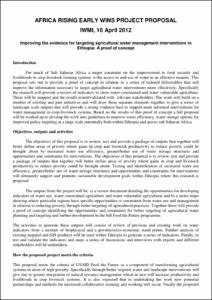Location
The International Water Management Institute (IWMI) is a non-profit, scientific research organization focusing on the sustainable use of water and land resources in developing countries. It is headquartered in Colombo, Sri Lanka, with regional offices across Asia and Africa. IWMI works in partnership with governments, civil society and the private sector to develop scalable agricultural water management solutions that have a real impact on poverty reduction, food security and ecosystem health. IWMI is a member of CGIAR, a global research partnership for a food-secure future.
IWMI’s Mission is to provide evidence-based solutions to sustainably manage water and land resources for food security, people’s livelihoods and the environment.
IWMI’s Vision, as reflected in the Strategy 2014-2018, is ‘a water-secure world’. IWMI targets water and land management challenges faced by poor communities in the developing countries, and through this contributes towards the achievement of the United Nations Millennium Development Goals (MDGs) of reducing poverty and hunger, and maintaining a sustainable environment. These are also the goals of CGIAR.
IWMI works through collaborative research with many partners in the North and South, and targets policymakers, development agencies, individual farmers and private sector organizations.
Resources
Displaying 386 - 390 of 959Introduction to the sustainable agricultural water management in cereal-based farming systems of northern Ghana project
Literature Review: The Experiences of Water Management Organizations in Bangladesh
This literature review was commissioned by Project “G3 - Water Governance and Community-based Management”, one of several projects funded by the Challenge Programme on Water and Food (CPWF) in the Ganges Basin. The project seeks to understand the different modes and outcomes of water governance in selected polders and the role that communities play in such governance.
Improving the evidence for targeting agricultural water management interventions in Ethiopia: A proof of concept - Africa RISING early wins project proposal
Establishing participatory hydrological monitoring in the Nile BDC
In this video, Matthew McCartney (International Water Management Institute - IWMI) reflects on his work in the CPWF-funded Nile Basin Development Challenge (NBDC). He particularly focuses on the hydrological aspects and the establishment of primary monitoring stations at the three project sites.
Healthy wetlands, healthy people: a review of wetlands and human health interactions.
Despite the production of more food and extraction of more water globally, wetlands continue to decline and public health and living standards for many do not improve. Why is this – and what needs to change to improve the situation? If we manage wetlands better, can we improve the health and well-being of people? Indeed, why is this important? This report seeks to address these questions.
Originally Published In: Ramsar Technical Report No. 6. Geneva, Switzerland: WHO; Gland, Switzerland: Ramsar Convention Secretariat









